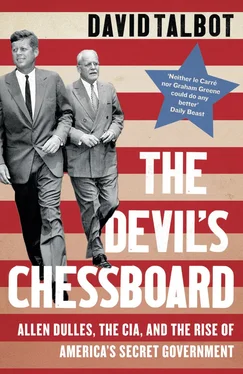Dollmann was high on their list of such recruitment targets. With his continental sophistication and network of contacts, Dollmann might prove a valuable espionage asset on the strategic front lines in both Italy and Germany. As Angleton sat with the well-groomed colonel in the Via Archimede safe house now, the American opened a bottle of Scotch whisky that he had brought along and carried on with his enthusiastic recruitment pitch. But as he listened, sipping the good Scotch, Dollmann was filled with utter contempt for his guest. “ He was talking like a young university lecturerwho dabbled a bit in espionage in his spare time,” mused the colonel. His views struck the world-weary German as typically American—naïve and overblown.
As for Dulles, Dollmann had only contempt for his benefactor, whom he later called “ a leather-faced Puritan archangel… [the type] who had fled from the European sink of iniquity on the Mayflower and now returned to scourge the sinners of the old world.” He would ridicule the way that Dulles had misrepresented himself at their secret Sunrise meetings in Switzerland as President Roosevelt’s personal emissary, delivering little speeches to Wolff and Dollmann about how “delighted” FDR supposedly was about the SS officers’ selfless mission for peace. “Wasn’t that nice now?” sneered Dollmann. “Such manly, upright and heartening words from President Roosevelt and his special representative in Europe, Mr. Allen W. Dulles!”
While Dollmann was unimpressed with Angleton’s political lecture, he did appreciate the fake identity card the young spy gave him. The document—which identified him as an Italian employee of an American organization—afforded Dollmann the confidence to venture into the streets of his beloved Rome without fear of being molested by the authorities. Sprung from his apartment, the colonel found himself drawn to some of his favorite old haunts. He strolled through the fashionable Via Condotti shopping district, where he paid a visit to the Bulgari jewelry shop.
In the old days, he had been treated like royalty by the Bulgari brothers, who would take him on tours of their vaults beneath the Tiber River, where there was a red room for rubies, a blue room for sapphires, and a green room for emeralds. The Bulgaris would pour him Napoleon brandy as they showed off the crown jewels of the late czar and other dazzling treasures. But those pleasant days were long gone. This time, when he suddenly appeared in the luxury shop, Giorgio Bulgari greeted him as if he were a ghost. “ We were all afraid you had been killed,” the jeweler told Dollmann, after he recovered from his shock.
During the war, Giorgio Bulgari had been so revolted by the deportation of Rome’s Jews—an order stamped by Dollmann’s boss, Wolff—that he and his wife hid three Jewish women in their own home. Now, gazing at the resurrected SS colonel, the jeweler undoubtedly wished Dollmann was dead. And Dollmann knew it.
Afraid he’d been killed? That was rich. Bulgari’s false concern infuriated Dollmann, but he adopted his usual droll manner. “How very amusing. People like me don’t just disappear forever like that.”
Dollmann always liked to give the impression that he was too cosmopolitan to indulge in the Nazis’ anti-Jewish mania. But now he felt offended by Bulgari’s forced courtesy; Bulgari “sickened” him—he was a “corpulent Levantine … [with] fleshy lips [and a] greasy smile.” Dollmann turned abruptly and fled the shop.
Once upon a time, Dollmann had had a love affair with Italy, and he was certain that his sunny “arcadia,” as he called it, returned his ardor. But now he was no longer certain. Dollmann had arrived in Italy two decades earlier, long before the war, as a young graduate student in Renaissance history. The young German was well educated, fluent in Italian, and boasted some sort of connection to the doomed Habsburg dynasty. He was also gay and charming, and he quickly shed as much of his stolid German upbringing as he could in favor of la dolce vita. With his slickly groomed hair, sleek Italian suits, and year-round tan, Dollmann went completely native, becoming Eugenio instead of Eugen.
Dollmann had been embraced by the German diplomatic set in Rome, who appreciated his nuanced grasp of the local language and customs, and by the Italian aristocratic set, who found him an amusing decoder of all things Deutsch. His binational skills were increasingly in demand as the two countries’ fates grew more closely linked. He was sought out by a principessa named Donna Vittoria, who was the reigning queen of Roman salons. Her soirees, held at her otherworldly palazzo in the imperial ruins of Teatro Marcello, were frequented by Mussolini’s daughter Edda and her husband, Count Ciano, as well as the leading Italian film stars of the day. She very much hoped to have Hitler, too, as an honored guest someday, the principessa confided to Dollmann.
In Naples, he was invitedto the midnight entertainments at Duchess Rosalba’s decaying mansion, festivities so lavishly debauched that they could have inspired a young Fellini. One night the lady of the house greeted Dollmann as she reclined on a divan and was attended to by two slyly grinning female dwarves and a well-built retainer packed into a form-fitting suit. The dwarves later appeared on a stage with a troupe of other diminutive performers, who enacted a long and baroque melodrama for the amusement of Duchess Rosalba’s guests. Dollmann was haunted not just by the odd performance but by the strange smile that his hostess fixed on him. The duchess, he noted, had “a simultaneously charming and inhuman mouth.” He later learned the story of her deformity. The duchess liked to prowl Naples’s rough waterfront bars for her handsome henchmen, replacing them in quick succession with one rugged seaman after another. One night she was attacked with a knife by one such jealous sailor, who left the mark of his fury on her once beautiful face.
But not even this decadent world could prepare Dollmann for the life he began when he joined the SS, where he would rise to become the link between the courts of Hitler and Mussolini. Dollmann later triedto make sense of why he had enlisted in Himmler’s death’s-head corps. It wasn’t political ambition that drove him—he insisted that he had none. And it wasn’t monetary reward. “I [already] lived well and comfortably, and my life, after I had yielded to my so-called motives, was no better than before, only more arduous.” Was it the way he looked in his trimly tailored SS uniform? Vanity was always a factor with Dollmann. Years later, he proudly displayed photos of himself standing in the very center of history, between Hitler and his visiting Italian dignitaries, gazing into the Führer’s magnetic eyes, ready to translate his every momentous word. Dollmann, always up to date on the latest Rome gossip, became a court favorite of Hitler. He was at the Führer’s side whenever Hitler and his retinue descended on Italy, and he was there whenever Mussolini or his top ministers trekked to summits in Germany.
By serving as the essential diplomatic link between Germany and Italy, Dollmann ensured that his sojourn in his adopted land would not be interrupted by the coming war. Dollmann would point to this as the primary reason why he made his Faustian bargain. Italia was the great passion of his life. “I loved Italy with the doomed love of all German romantics.”
It was the most peculiar of ironies, and one that Dollmann and his intimates no doubt privately relished. The man who kept the Axis partners smoothly aligned, with his impressive language and social skills, was a highly educated, arts-loving homosexual who enjoyed trading in the most salacious gossip about the personalities who ruled Germany and Italy. Dollmann was, in short, precisely the type of person the Nazis sent to the gas chambers. But instead, Hitler’s interpreter was free to attend gay and lesbian orgies in Venice, a city whose shadows offered some protection from the authorities’ prying eyes. And he had the pleasure of going on shopping safaris with Eva Braun, Hitler’s companion, during her Italian holidays.
Читать дальше











